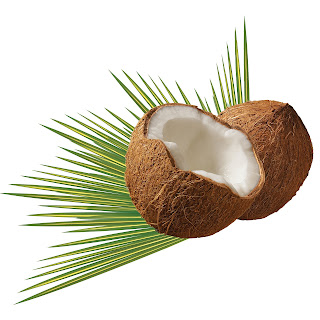By Sri Regine Lherisson-Bey
Before it became mainstream in North America, coconut was used as a food staple in India, Asia, and the Caribbean. At some point, negative propaganda spread some misinformation about coconut causing high cholesterol issues. There is no such a thing as cholesterol in the vegetable kingdom where coconut resides. Scientific research eventually contributed to dismiss people’s misconceptions about coconut. As people are becoming more aware, they are also learning to appreciate the value of coconut. Many health benefits come from the components of coconut:
1. Coconut water
It is perfectly pure and quite replenishing. It also provides essential electrolytes that are necessary for bodily function and a slender figure.
After a good workout or strenuous efforts, coconut water not only quenches thirst but also provides trace minerals with life-giving properties.
2. Coconut pulp (also called ‘coconut meat’)
A very nourishing and fiber-rich food, it is used to prepare the following fares:
- Coconut milk – It is made from the white pulp. Even though it is not as nourishing as animal milk, it contains other nutrients that do not exist in mammal milk and give it reasonable nutritional value. Coconut milk also has high amounts of potassium and the right amount of fats to maintain cellular nourishment and structural integrity. Coconut milk contains Vitamin C — even B-12 — a vitamin that is rather rare in the vegetable kingdom.
- Coconut powder – It constitutes a great addition to health beverages such as smoothies and can act as a delicious thickener of liquid foods and desserts.
- Coconut chips – As a natural treat, coconut chips can enchant the olfactory senses and the palate with their sweet aroma and delightful taste. Coconut chips’ crunchy texture is quite fulfilling. When properly prepared with organic coconut and toasted to perfection, coconut chips constitute a wholesome dessert or snack.
Whether liquefied or dried up, coconut pulp promotes colon hygiene through regularity, and this is particularly due to its high fiber content. It is the high amount of fiber in coconut that also helps keep cholesterol levels down and the system balanced.
3. Coconut oil
- As food – Coconut oil can replace all types of artificial and toxic cooking oils such as so-called vegetable oil that contain petrochemicals and generate free radicals, causing health issues.
In spite of its noted amount of saturated fats, if consumed in moderate amounts, coconut oil does not promote weight gain.
One of the main benefits of ingesting coconut oil is the reduction of excess body fat, particularly abdominal fat, the most dangerous type of fat to carry. Coconut oil curbs hunger and is very convenient during times when one needs to reduce food consumption without taking appetite suppressants. That is one of the ways coconut oil helps shrink stomach and abdominal size.
- As skin care ingredient – It is prepared by processing coconut pulp. Its uses are numerous. Coconut oil has been used for thousands of years to enhance hair, skin, and nails. Coconut oil is known to nourish the scalp, make hair soft and shiny. It helps ward off the premature graying of hair and stop the production of dandruff.
Whenever one uses non-toxic products on the skin, it is more likely to be beautified and capable of regenerating itself more fully. Both coconut milk and coconut oils can be used as skin cleansers and natural shampoo. In an era where most personal care products are toxic and made of petrochemical that are known neurotoxins, coconut products are a wholesome convenience for personal care. In the book HOW TO DETOXIFY YOUR LIFE NATURALLY, there is ample information on the necessity of using natural, non-toxic oils for bodily care. By using natural, non-toxic coconut oil on the skin, the cells are protected and the organs kept safe.
Coconut oil is said to be an anti-aging agent and this is mostly due to its anti-oxidant, nourishing, and moisturizing properties. Because of its subtle, sweet natural fragrance, many people enjoy applying coconut oil on their skin and hair.
Science has shown that coconut oil is anti fungal, anti bacterial, and quite detoxifying for the scalp, skin, and all organs. Some people have found relief from nail fungus with regular applications of coconut oil.
Coconut oil carries the very beneficial property of natural sunscreen. Additionally it serves as a perfect non-toxic personal lubricant.
4. Coconut husk (the fibrous external part)
It is widely used in cleaning items such as kitchen sponges and is often used as a scrubbing agent. Coconut husk is also used to make natural, non-toxic, biodegradable mats, carpets, ropes, brushes, mattresses, etc. These items are all environmentally-friendly and constitute an ideal addition to any eco-conscious person’s array of household necessities. In the book GET SLIM EFFORTLESSLY, one can find data on the connection between environmental hazards such as xenoestrogens and excess weight.
There are different varieties of coconut products n the market nowadays. Some manufacturers produce fractionated coconut oil that is mixed with petrochemicals to keep it liquid at very low temperatures. One is better off using pure, unadulterated coconut oil for cooking and personal care.
Some other manufacturers of coconut oil mix it with canola oil, a genetically-modified oil made from rapeseed. The disadvantage with such oil is that it introduces free-radicals and trans-fats in the body.
Whether one is enticed to use coconut for a healthy way of life or for self-healing, the benefits are endless. A food staple that has withstood the test of time, coconut has proven itself to be a health-giving and slimming food on many levels. Just as the Hollywood celebrity nutritionists recommend, for good health and a slim body, eat, drink, and use coconut.
Sri Regine Lherisson-Bey is a Therapist, Author, and Life Coach voted Wellness Expert. She is the Author of several books on integrative wellness and weight management, including HOW TO DETOXIFY YOUR LIFE NATURALLY and GET SLIM EFFORTLESSLY.

